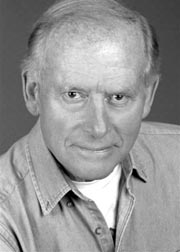James D. Houston-who taught writing part-time at UCSC as a lecturer for more than two decades-died on April 16 at his home in Santa Cruz. He was 75.
The acclaimed author of eight novels, including Snow Mountain Passage and Continental Drift, Houston also wrote nonfiction works that include Californians; In the Ring of Fire: A Pacific Basin Journey; and Farewell to Manzanar, which he coauthored with his wife, Jeanne Wakatsuki Houston.
The latter-a true account of her family's experience during and after the World War II internment-is now in its 67th printing and has become a standard work in schools and colleges across the country.
Steve Woodhams (Porter College 1974-77) offers the following remembrance of Houston:
"I took two classes with Jim Houston in the seventies at Crown College. They were classes taught from the point of view of a working writer, who had the authority but didn't have to be the authority, which may be why they made such an impression.
The first day Jim announced that only a handful of people made a living from writing and then talked about what it was like to work as a writer, income or not: especially that moment when an idea for a novel came to him. He described it as a flash of satori that would then take years to fulfill.
He said you couldn't write from flash cards full of big ideas about humanity. He'd tried that, he said, shaking his head. He talked about his work in the same forthright way he discussed ours, appreciating the essence or the scene that sparked, especially one scene set in an apple orchard that someone presented in the workshop.
I don't remember the harsher aspect of critiques or personalities spiraling out of control. That was not in his affable judicious ethos. Some afternoons we sat outside under the oak trees, talking in an easy-going circle. He often ended a discussion with a good-humored, "Well, back to the drawing board" taking the sting out of a less than favorable class response. Because when he said that it was as if he were talking about his own writing. It was assumed-that a writer always went back to the drawing board.
He brought guests to class, Al Young and Peter Beagle, introducing us to this society of authors, happy to share the floor and camaraderie. Then he was working on a novel about "Holy City" the ghost town, off the summit, and his exploration of history and the near-at-hand locales brought a dimension to the class, a richness to what writing could be.
Over the years I was to learn much more about his interest in the west, in Hawaii and about his own fascinating background but then I just saw glimmers as I did of my own life ahead-I didn't realize who he really was. But when decades later I saw a tall man walking with a friend late at night in North Beach, I recognized him at once. I fell in with them for several blocks, and when I said I'd been his student-it had been over twenty years--he graciously said, 'Yes, I thought that was you.'
After UCSC, I didn't see much of him in person but you couldn't help but be aware of his presence, his respectful witness of all things writing, western, and pacific. From what I recall today I know he was the best kind of teacher-the kind who gave you yourself."
Steve Woodhams (Porter College 1974-77), now teaches English at Chabot College in the East Bay.



